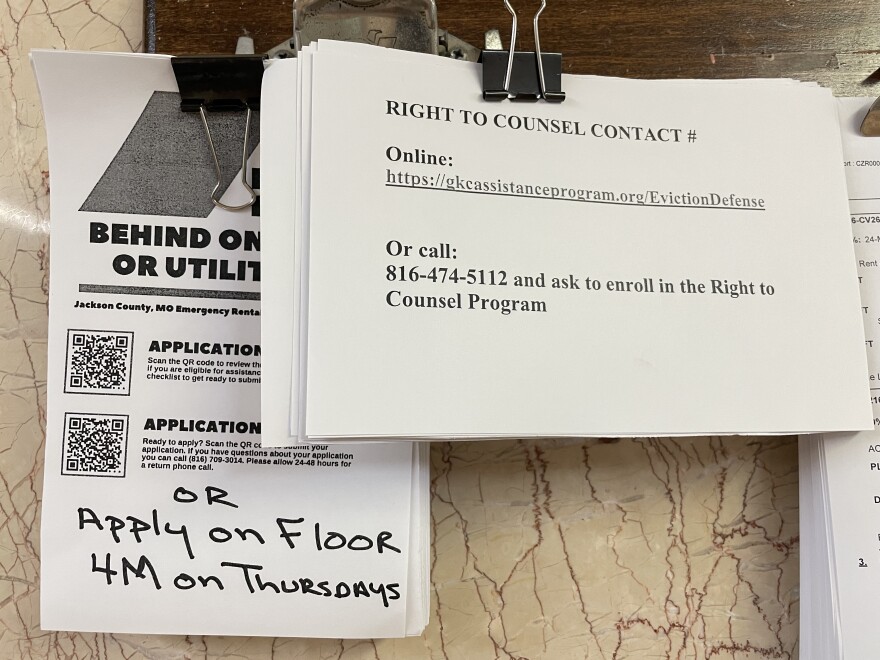On a cool Thursday afternoon in late September, Chris Ward finds himself on the seventh floor of the Jackson County Courthouse. Sitting on a hard wooden bench outside the courtroom doors, he’s feeling stressed.
“I don't know what's going on because I'm confused,” he says. “This is a complicated process.”
This is Ward’s first time facing eviction. But during this, his second visit to the courthouse, Ward finds he doesn’t have to fight his case alone. Sitting beside him on the bench is an attorney who walks him through the case and explains his legal options. Every few minutes, the attorney walks into the courtroom to talk to the judge or the property management company on Ward’s behalf.
“I'm glad he is over there,” Ward says. “Cause I would be screwed. They're just getting me tangled in this.”
Ward’s free legal representation comes thanks to Kansas City’s right-to-counsel program. Since June, tenants who live in Kansas City and face eviction in court are entitled to representation by an attorney, free of charge, regardless of their income level.
Since June, 372 cases in Jackson County Circuit Court have been referred to an attorney, according to city data. More than half are still going through the legal process. But of the cases that have been adjudicated, 75 were dismissed, resolved by agreement between the landlord and tenant, or resolved by a ruling in favor of the tenant.
“Just as we expected, attorneys make the difference between tenants being housed or being on the streets,” says Gina Chiala, lead attorney at the Heartland Center for Jobs and Freedom, a nonprofit participating in the program.
Tenant union KC Tenants championed the right-to-counsel program last year, along with the Heartland Center for Jobs and Freedom, Stand Up KC and Missouri Workers Center. The Kansas City Council approved the program with overwhelming support last December.
Tenants in Kansas City facing eviction can call the city’s hotline at (816) 474-5112 or fill out an online form at its eviction defense website.
Attorneys like John Michael Pipes and Chiala of the Heartland Center are seeing how the program has changed the dynamics of eviction court. Previous data had shown that tenants were more likely to lose their cases, end up with evictions on their records and lose their homes when they didn’t have legal representation.
Since the program launched in June, Pipes has been assigned to 48 cases. He says none have ended with an eviction judgment.
“Having an advocate who knows the dynamics of court, knows the rules and also is able to navigate a negotiation of a settlement or a dismissal really changes the way that these outcomes take place and these cases go,” he says.
Jane Pansing Brown, director of Kansas City’s Housing Department, agrees.
“For someone who's being evicted, in most cases it's their first time having this happen,” she says. “So it's not only unfamiliar, but it's very scary. When you have someone there representing you who understands the system, it takes away a lot of the fear and also can provide a better result.”
To run the program, the city contracted with three organizations: Legal Aid of Western Missouri, the University of Missouri-Kansas City School of Law and Heartland Center.
Chiala says there are 13 attorneys in the program, two shy of the 15 attorneys the city budgeted for. That has been adequate so far, she says, but she notes eviction filings have climbed in recent weeks.
“We're starting to see some strain in our caseloads,” she says. “At first we were able to keep up with 13, but we're going to need that full 15.”

Program advocates say there’s still room to strengthen it.
Sabrina Davis, a leader of KC Tenants, says the city needs to make more residents aware of the program and their right to legal counsel. Currently, the court sends Kansas City officials a list of people who have received eviction filings, which enables the city to send them a letter notifying them of their right to a free attorney.
But that agreement doesn’t exist for Kansas City residents who end up in court in Platte or Clay counties.
“There's still a lot of people, Jackson County, Platte County, Clay County that have no idea that there is such a thing as right to counsel,” Davis says.
And there are still tenants who fall through the cracks and don’t get representation. If a tenant calls asking for representation and their trial date is due to take place within three days or less, attorneys have the discretion to turn down their case.
“We want the attorneys to have that independence to say, ‘Hey, I can't competently represent this person because I only have three days to prepare for trial, and I have10 other cases that day,’” Chiala says.
Chiala thinks more proactive outreach from the city to residents about their right to an attorney would help.
With the program's enactment, Kansas City became the 13th city nationwide to guarantee legal representation to tenants in eviction court.
The results in other cities have been encouraging. In San Francisco, which passed its right-to-counsel law in 2018, recent data show that 59% of tenants represented by counsel stayed housed. In New York City, eviction filings have decreased by 30% since the program was established in 2017, and 84% of tenants stayed in their homes.
Chiala is hopeful Kansas City will see similar results.
“Right to counsel is a deterrent because landlords know now that it's not going to be a short, quick and easy process to evict the tenant,” Chiala says. “They're going to be more willing to work with that tenant before they run to the courtroom door.”






